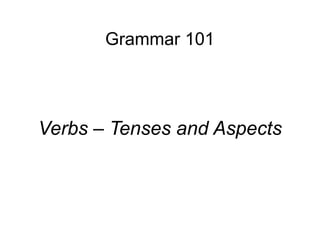
LL Lower Pri B - Tenses and Aspects of Simple and Continuous Verb Forms
- 1. Grammar 101 Verbs – Tenses and Aspects
- 2. Learning Objectives To understand tenses and aspects of simple and continuous verb forms To use them in sentence-construction.
- 3. Introduction ● Grammar covers the rules of language use. ● Without grammar, we can use language in whatever fashion we like. ● Without rules, everybody is correct. It'll be quite scary as we might not be able to understand one another. ● This topic describes one important part of grammar – verb form changes.
- 4. Verb Forms ● Four types of Tenses will be introduced for the purpose of our course. 1) Simple Present 2) Present Continuous 3) Simple Past 4) Past Continuous
- 5. Simple Present ● Timeline: ● Characterised by: 's' or 'es' behind all verbs (or unchanged if they are plural verbs) 1) He likes to kicks football. (singular verb - likes) 2) They like to kick football. (plural verb - like)
- 6. Simple Present ● It is used for something that's the generally accepted as the truth – it could be a general truth, a habit or a physical event. 1) He is always late for school. (habit) 2) The sun rises in the east. (physical event) 3) My father is a well-known businessman. (general truth)
- 7. Present Continuous ● Timeline: ● Characterised by:'am' , 'is' or 'are' + verb ing 1) He is studying. 2) They are revising. 3) I am revising.
- 8. Present Continuous ● As the name implies, it is used for something that is still going on (continuous) presently (present). Hence, the name, present continuous. 1) Shawn is having dinner now. 2) I am preparing for my presentation tomorrow. 3) Fiona is sitting for an examination currently. Q: Why do the highlighted words show?
- 9. Simple Past ● Timeline: ● Characterised by:'ed' for past tenses 1) I received a phone call just now. 2) David married his childhood sweetheart.
- 10. Simple Past ● It is used for an event that happened for a single moment in the past. Given that example earlier, E.g., David married his sweetheart. It referred to the specific moment in time when David and his sweetheart was pronounced man and wife. Further examples, 2) The kids enjoyed the outing at the zoo. 3) When I was a kid, I collected stamps.
- 11. Past Continuous ● Timeline : ● Characterised by: 'was' or 'were' + verb + ing 1)They were singing in the karaoke for two hours. 2) The fans were waiting for their idol when it rained.
- 12. Past Continuous ● Like present continuous, it is used to show a continuous action but in the past. Hence, the term past continuous. 1) The children were dancing in the dance hall. 2) We were having our dinner when the bell rang. 3) My parents were napping when I reached home.
- 13. Learning Activity ● Using the word 'finish', write 4 sentences for 1) simple present, 2) simple past, 3) present continuous and 4) past continuous.
- 14. Learning Activity Suggested Answers ● The possible answers are: 1) simple present – David likes to finish his homework early. 2) simple past – Alex finished his homework late at night yesterday. 3) present continuous – Please don't disturb mother as she is finishing her cooking now. 4) past continuous – We were finishing our run during PE lesson when it rained.
- 15. Discussion ● What are the 4 verb forms discussed in this lesson? ● What method can we use to remember these verb forms
- 16. In Summary ● We discussed Simple Present, Simple Past, Present Continuous and Past Continuous. ● We can use the timeline to imagine how these verb forms are.
